As culture becomes more accepting of transgenderism, a doctor is warning that there’s a related issue that reportedly has an unfortunate stigma among some in the medical community: the decision by some people who have undergone reassignment surgery to reverse course.
READ: To Everyone Telling People Their ‘Thoughts and Prayers’ Don’t Matter After Las Vegas
Dr. Miroslav Djordjevic, leader of the Belgrade Center for Genital Reconstructive Surgery in Belgrade and a staff member at New York City’s Mount Sinai Hospital, recently told The Telegraph that he has seen an uptick in the number of people seeking reversals.
Djordjevic, who has performed gender reassignments for the past decade, also said that many of those exploring reversals weren’t properly given psychiatric screening before their surgeries and urged his fellow medical professionals not to badger them over their decision to turn back, The Daily Mail reported.
In addition to the seven reversals that Djordjevic has already performed over the past five years, the doctor said that he is consulting with eight additional transgender persons who are looking to also reverse course.
Most of these individuals are biological men who want their male genitalia back, with some of them reportedly exhibiting depression and suicidal inclinations. Newsweek dove into more on some of the controversial research surrounding transgender issues:
A 2011 study found that after sex reassignment surgery, more than 300 Swedish transsexuals faced a higher risk for mortality, suicide ideation, and psychiatric issues compared to the rest of the population. The researchers concluded, “Our findings suggest that sex reassignment, although alleviating gender dysphoria, may not suffice as treatment for transsexualism, and should inspire improved psychiatric and somatic care after sex reassignment for this patient group.”
As for Djordjevic, he said that he spends a plethora of time with his patients both before and after surgery to ensure that psychiatric evaluations have been properly conducted.
“Definitely reversal surgery and regret in transgender persons is one of the very hot topics,” he told The Telegraph. “Generally, we have to support all research in this field.”
Djordjevic’s cautions about reversal come amid reports that transgender surgeries rose 20 percent between 2015 and 2016, with over 3,000 operations unfolding in the U.S., Newsweek reported.



